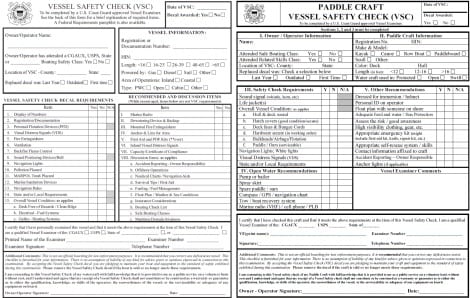 By Bob Currie, Recreational Boating Safety Specialist
By Bob Currie, Recreational Boating Safety Specialist
U. S. Coast Guard Auxiliary Station Galveston Flotilla
One of the most important ways for recreational boaters to increase their safety on the water is to undergo a free U.S. Coast Guard Vessel Safety Check (VSC). The Auxiliary has certified vessel examiners who will come to your location to perform the VSC. Our Galveston Flotilla performed 58 VSCs in 2019. We performed VSCs on powerboats, sailboats, and one kayak. Yes, even kayaks are eligible for a free VSC.
The Station Galveston Flotilla of the US Coast Guard Auxiliary operates out of the USCG Station Galveston base on Galveston Island. They aid the Coast Guard by providing maritime observation patrols in Galveston Bay; by providing recreational boating vessel safety checks; and by working alongside Coast Guard members in maritime accident investigation, small boat training, Aids to Navigation verification, and watch standing.
Why You Need a VSC
VSCs save lives. Trained and certified vessel examiners can find problems with your boat and its safety equipment that could lead to sinking, loss of control leading to collisions, onboard fires, and other incidents that could lead to death or injury if not caught in time. Vessels that pass a VSC are awarded a decal that is affixed to the port side of the boat. The decal informs the Coast Guard and other boating regulatory agencies that your boat was in full compliance with federal and state boating regulations during a safety check for that year. The VSC is free and can be performed with your boat in or out of the water.
What Happens if You Don’t Pass
If your boat does not pass the free VSC, the report given to you by the examiner points out the discrepancies so that you can fix them before you suffer any consequences such as sinking, fire, or collision. In addition, by fixing the discrepancies you are immediately eligible for a follow-up inspection, allowing you to receive the VSC decal once the discrepancies have been fixed. You do not receive a citation if your boat does not pass the VSC. If you go out on the water and are stopped by the Coast Guard before correcting any discrepancies, you are subject to being fined for each discrepancy.
What Items are Checked
We have a checklist for different types of vessels. We have a separate checklist for paddle craft. The standard VSC and paddle craft VSC are shown below. We check for required items such as:
- Proper display of registration numbers on your boat
- Possession of registration documentation
- Visual distress signals
- Fire extinguishers
- Ventilation (inboard and inboard/outboard engines)
- Sound producing devices (horn or whistle)
- Navigation lights
- Overall condition of the vessel

Discrepancies Typically Found
We do have a list of most commonly found discrepancies. They include the following:
- No visual distress signals: the requirements for visual distress signals are different for boats operated on inland and coastal waters. Boats 16 feet and over operated on coastal waters are always required to have both day and night visual distress signals at all times. Boats less than 16 feet operated on coastal waters need only carry night visual distress signals when operating from sunset to sunrise. Our local bays are considered to be coastal waters.
- Expired visual distress signals: Many people have the required pyrotechnic devices, but they are expired or are not Coast Guard approved. Roadside flares do not meet the requirement unless they specifically say Coast Guard Approved. Pyrotechnic devices such as flares and rockets are good for 42 months from the date of manufacture. All I can say is time flies when you are having fun.
- Fire extinguishers: Like pyrotechnic visual distress signals, fire extinguishers must be both Coast Guard approved and not expired. Fire extinguishers last much longer. They are within the expiration limit for 12 years after the date of manufacture as long as the gauge shows they are in the green and they are in good condition.
- Life jackets: Life jackets, also know as personal flotation devices (PFDs), must be Coast Guard approved and in good serviceable condition. A wearable PFD of suitable size is required for each person on the boat. Children must have properly fitted PFDs designed for children. Wearable PFDs must be “readily accessible.” Boats 16 feet or longer must also have one Type IV throwable device (cushion or ring buoy), and it must be immediately available. PFDs must not be stored in unopened plastic packaging. For Personal Watercraft riders, the PFD must be worn. An impact rating is recommended but not required.
- Navigation lights: All boats must be able to display navigation lights between sunset and sunrise and in conditions of reduced visibility. Boats 16 feet or more in length must have properly installed, working navigation lights and an all-round anchor light capable of being lit independently from the red/green/white running lights. Since most people do not operate at night, it is easy for connections to become corroded from non-use. Be sure to test your lights frequently.
Coast Guard Recommendations
Once the vessel passes all the required items, it is eligible to receive the VSC decal. The Coast Guard has many recommendations beyond the required items, however. While encouraged, the items below are not VSC requirements:
- Marine VHF/FM radio
- Dewatering Device and backup (bilge pump with manual bucket as backup)
- Mounted fire extinguishers (keeps them from banging around)
- Anchor and line for area (7 feet of length for every foot of depth)
- First Aid kit
- Nautical charts/navigational aids (GPS)
- Fuel Management plan: 1/3 out, 1/3 back, 1/3 for reserve
- Float plan (file with a friend or family member)
- Safe Boating Class (required for boaters born after August 31, 1993)
Summary
Let the Coast Guard Auxiliary help you become a safer and more responsible boater by undergoing a Vessel Safety Check. It is free, the vessel examiner comes to you, and you will obtain peace of mind in the safety of your boat.
For more information on boating safety, please visit the Official Website of the U.S. Coast Guard’s Boating Safety Division at www.uscgboating.org. Questions about the US Coast Guard Auxiliary or our free Vessel Safety Check program may be directed to me at [email protected]. I am available to perform free Vessel Safety Checks, and I will come to your location to perform them. SAFE BOATING!
[1-6-2020]

 Posted in
Posted in 
























